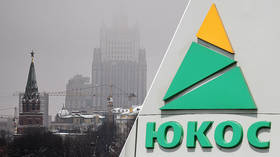Moscow claims win after US court rejects oligarchs' demand for seizure of Russian assets in $50bn Yukos legal battle

The Ministry of Justice in Moscow has welcomed a decision by a US court to freeze proceedings in the case over Yukos, with the world’s largest legal settlement now left dangling. The former oil giant was declared bankrupt in 2006.
In a statement to reporters, officials said that the court had agreed with Russian lawyers that a parallel case in the Netherlands meant litigation in the US would be “a fruitless exercise.” The legal battle between the country and Yukos’ ex-shareholders has dragged on for close to 15 years after the collapse of the company. Dutch judges had previously awarded them around $50 billion in damages, but that decision is now being appealed in one of the country’s top courts.
Yukos was acquired from the Russian state by the oligarch-controlled Bank Menatep, during the controversial "loans for shares" auctions of the mid 1990s, and for a fraction of its real value. The oligarchs were immensely wealthy Russian businessmen with powerful political connections, who held dominant positions in business and politics, particularly under the pro-Western Yeltsin government of the 1990s. The claimants argue that a giant tax bill handed to the business in 2004, as well as fraud charges against its leaders, led to its collapse and amounted to politically motivated ‘expropriation.’ Russia has claimed that the investors are not ‘bona fide’ or foreign, and therefore are not covered by international treaties. The case, Moscow says, should be settled solely in Russian courts.
Also on rt.com Weaponized courts: The $50 bn Yukos case may be the final straw for Russia, ending its cooperation with Western ‘justice’The American judge also refused a request from the former shareholders of Yukos to order the seizure of $7bn-worth of Russian assets in the US, should the country lose the case and consider not paying. In the ruling, the court stated that “the Russian Federation is a sovereign country with economic tendrils that cross the globe, not an insecure potential debtor that must be required to post security, lest there be no assets to seize at a later date.”
Speaking exclusively to RT, Carolyn Lamm, a partner with White & Case, a law firm representing Russia in the US litigation, said that the decision “set a good precedent.” According to her, “The US court rejected the Yukos oligarchs’ baseless suggestion that the Russian Federation cannot win in the Netherlands, noting that indeed the history of this dispute has been unpredictable.
“Although the Yukos oligarchs did win the arbitration in 2014, the Russian Federation then won the first-instance litigation in 2016 and has had multiple other successes during the subsequent years.”
She added that “with the leadership of the Ministry of Justice, the Russian Federation’s legal teams are now pursuing its options in a number of courts around the world and defending against similar attempts to enforce prematurely in the Netherlands and the United Kingdom. All such premature enforcement should be suspended until the legitimacy of the arbitral awards is finally determined.”
Professor Albert Jan van den Berg, who is leading the team representing Russia in the ongoing arbitration, told RT that “the District Court, while weighing the Parties’ competing interests and balancing hardships, emphasized the “enormity” of the amounts awarded under the Yukos Awards,” and underlined that the “findings yet again confirm the propriety of the Russian Federation’s position in enforcement proceedings as well as the impropriety of the former Yukos shareholders’ attempts to burden the Russian Federation and several country’s judicial systems with premature enforcement requests.”
Earlier this month, the Dutch Advocate General moved to recommend that the Netherlands’ top court enforce the settlement in favor of the Yukos shareholders. However, a decision by justices is expected over the coming weeks.
Perhaps the best-known of the Yukos oligarchs was Mikhail Khodorkovsky, once considered the wealthiest man in Russia and listed by Forbes as the 16th richest person in the world, with a fortune said to have been around $15 billion. He is technically no-longer directly involved in Yukos, having transferred his shares to fellow Oligarch, Israel-based Leonid Nevzlin.
Like this story? Share it with a friend!














